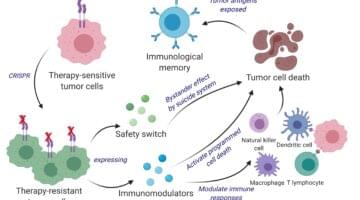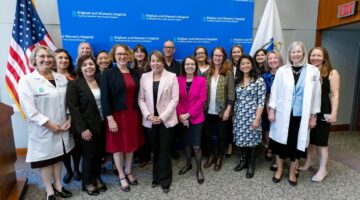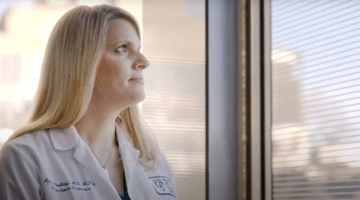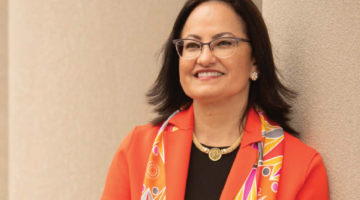
You left a research career to join the newly formed Brigham Research Institute (BRI) as a program manager about 10 years ago. Do you miss doing research?
As researchers, if we’re lucky, about 10 percent of our experiments work. I certainly don’t miss the 90 percent of the time my experiments didn’t work! This turned out to be my dream job.
Why is it your dream job?
Every day I learn something new due to the amazing science and research we do here at the Brigham. So, although I don’t do research myself, I get to hear about everyone’s 10 percent success! A lot of what we do at the BRI is introduce researchers who might not otherwise ever meet. We call them “collisions of collaboration.” With more than 1,000 investigators here, there are many opportunities to collaborate. I get to connect people who might, for example, be working on the same protein but from completely different angles and/or in different disciplines. Acting as an advocate for research, discovery, and innovation, I also feel like I can contribute more broadly than I personally could have as a research scientist.
Why was the BRI created?
Our hospital leaders were concerned about downward trends in the success rates for funding for biomedical research from the National Institutes of Health, the primary source of research funding in this country. They’d also been hearing from researchers who wanted to be better integrated with the hospital.
So the hospital created the BRI with the mission to foster collaboration among researchers, raise the visibility of medical research at BWH, and find ways to increase funding and resources for the research community. It’s been a great adventure. In the past 10 years, the number of our researchers has grown by about 20 percent while our research income (and the number of publications by BWH authors) has increased by about 80 percent.
How has the BRI contributed to science during the past decade?
Some examples are easier to quantify than others. In the past nine years, we’ve awarded almost $6 million from our Fund to Sustain Research Excellence, which supports early-stage research by “bridging” investigators while they compete for NIH funding. The 95 researchers who have been awarded bridge funding have received more than $213 million in funding from various sources. That’s a fantastic return on investment—and it’s just the tip of the iceberg.
What sorts of contributions are harder to measure?
The anecdotal successes: Who did we introduce to each other? Who did we train who became a leader somewhere else? Who found out about a funding opportunity through the BRI?
Last year at Discover Brigham, our annual event celebrating the research community, I ran into a researcher who told me, “We met a few years ago and you changed my life!”
She attended one of the BRI’s luncheons, where I gather researchers I haven’t met yet for an afternoon of lunch, presentations, and discussions. We bring them together with hospital leaders and BRI staff to learn more about what they do and how we can help them.
This scientist specializes in a rare disease, and while we couldn’t help her with funding, we did build her a website. Three years later, because she’s searchable worldwide, thousands of potential patients have found her through the site we created. Her website now gets more than 1,500 hits per month. In the 21st century, if our researchers don’t have websites it’s as if they don’t exist, so there’s definitely a return.
If you love learning and being exposed to new things, this is a playground. I’ve learned something new every day for more than 10 years.
What keeps you up at night?
I’m always worried about funding. In that regard, I still feel like a researcher.
What gets you up in the morning?
If you love learning and being exposed to new things, this is a playground. I’ve learned something new every day for more than 10 years. What’s not to love about that?!
Who are your medical/scientific heroes?
The brilliant scientists we work with here are my heroes. I’m honored to work in this rich environment among such creative, dedicated and inspiring individuals.










